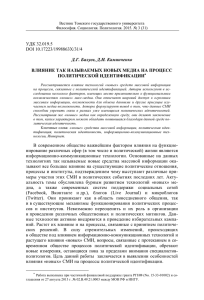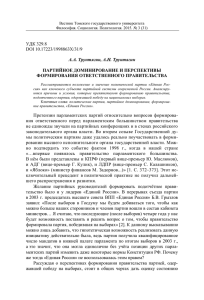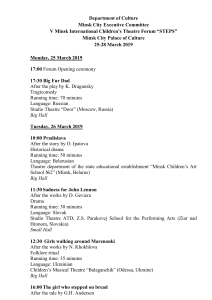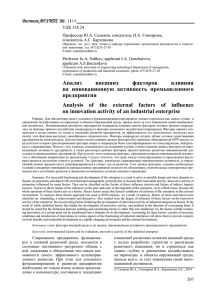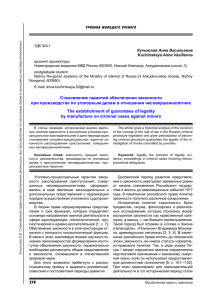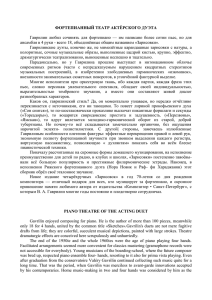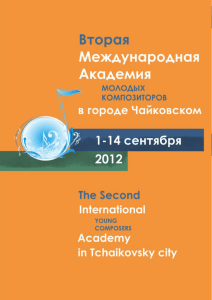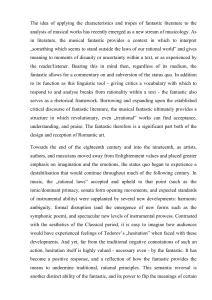Untitled - Cloudfront.net
реклама
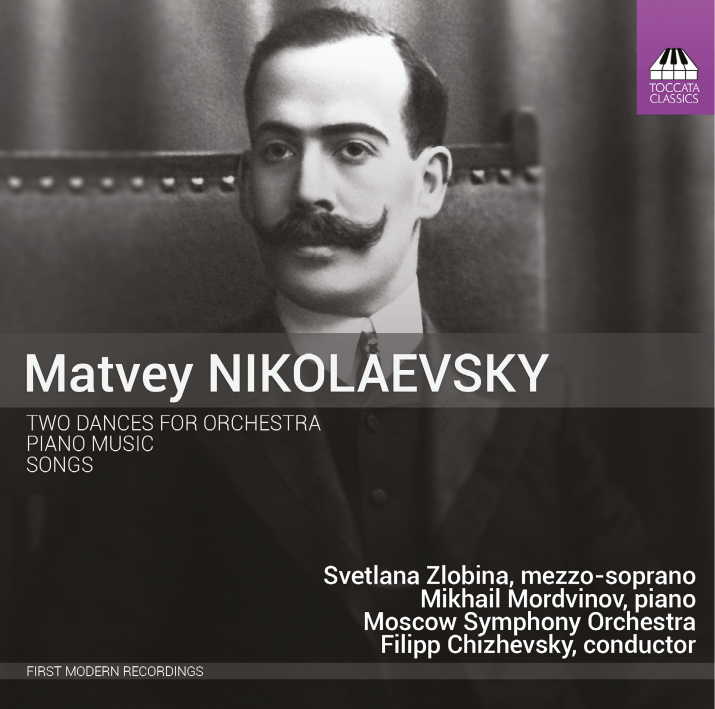
MATVEY NIKOLAEVSKY: A LIGHT-MUSIC MASTER REDISCOVERED by Anthony Phillips History – not least the tangled cultural history of Soviet Russia – has not been kind to the gifted Matvey Nikolaevsky. Yet on 27 May 1938, at the peak of his popularity in the 1920s and ’30s, an astonishing array of the cream of Soviet musical life filled the Great Hall of the Moscow Conservatoire to celebrate the 35th anniversary of Nikolaevsky’s artistic career – although his handwritten autobiographical résumé reveals that his working life had begun much earlier, at the age of twelve. His career embraced distinction as pianist, as composer of a string of universally known and loved ballads, popular songs, dance numbers, orchestral marches and genre pieces, and as a much-respected piano teacher with several books of keyboard technique instruction to his credit. One at least such tutor, entitled Conservatoire [i.e., ‘correct’] Positioning of the Hand on the Piano, first appearing in 1917, has been republished countless times, is in print and is widely used to this day. Among the famous names from the world of music, opera and ballet taking part in the 1938 gala concert were the composers Reinhold Glière and Sergei Vasilenko; the conductors Nikolai Golovanov (music director of the Bolshoi Theatre), Yuri Feier, Alexander Melik-Pashayev and Samuil Samosud; the pianist Alexander Goldenweiser, then Rector of the Moscow Conservatoire; the prodigy violinist Busya Goldstein; a clutch of the Soviet Union’s most celebrated singers: the sopranos Antonina Nezhdanova and Maria Maksakova, mezzo-soprano Nadezhda Obukhova, tenors Ivan Kozlovsky and Vadim Kozin (the latter a noted singer of Nikolaevsky’s songs but soon, alas, to be arrested and sentenced to eight years in the Gulag, an ordeal from which he never recovered); the bass-baritone Panteleimon Nortsov and the basses Alexander Pirogov (a peerless Boris Godunov) and Mark Reisen; harpists Vera Dulova and Ksenia Erdeli; the Bolshoi prima ballerina Sofia Golovkina, actors Rina Zelyonaya, Vladimir Yakhontov and Igor Ilyinsky; and the folk-singer Lydia Ruslanova, whose signature tune was to be the wartime song Katyusha, specially written for her, even though it failed to protect her from receiving a sentence of 10 years in the Gulag immediately after the war.1 In 1938 1 Her husband was General Vladimir Kryukov, Commander of the Red Army Cavalry Tank Corps in the final offensive in Poland and Germany in World War II. His proximity to Marshal Georgy Zhukov made him a potential threat to the increasingly paranoid Stalin and he was sentenced to 25 years in the Gulag; when Ruslanova refused to sign a statement attesting his guilt, she, too, was transported to the Gulag. Both Kryukov and his wife were released only after Stalin’s death in 1953, following which 2 this galaxy of stars were among the country’s most admired performers, holders of the accolade ‘People’s Artist of the USSR’, Stalin Prizes and the like. At the celebratory concert, classics of Russian and western music alternated with light music, poetry and choreographed numbers, and the evening concluded with a riotous set from Vladimir Kandelaki’s dance-band Jazz-Goal. This event was taking place at the very summit of the Yezhovshchina, the two-year reign of terror unleashed by Stalin’s executioner-in-chief, the NKVD supremo Nikolai Yezhov, who employed unparalleled brutality in the judicial arrest, murder, imprisonment and death in the Siberian forcedlabour camps of the GuLag of up to a million-and-a-half innocent people, mainly from the Soviet elite in all walks of life. An evening dedicated so single-mindedly to delightful entertainment must have offered its audience considerable, if temporary, respite from the horrors potentially menacing virtually every man, woman and child in the Soviet Union. In any case, the programme represented a testament to the reverence in which the person and reputation of Matvey Nikolaevsky were held, as a widely played composer, a successful accompanist and repetiteur, in which capacity he had worked at the Bolshoi Theatre coaching singers and dancers for twenty years, as a respected piano professor and as all-round active public figure in the cultural sphere. The family archives contain laudatory dedicatory notes from such outstanding musicians as Glière and the Bolshoi Theatre conductor and choirmaster Vasily Nebolsin. Matvey Iosifovich Nikolaevsky (his given name was originally Mordukh) was born in Moscow on 28 June 1882. Like his brother Fyodor (Fotvush), who later became a celebrated military bandmaster, Matvey inherited his talent and love for music from his father Iosif (Yossel-Zelman) Lvovich Nikolaevsky, an orchestral clarinettist. When he was two years old, the children’s mother, Maria, died and his father later married Sofia Mikhailovna. When he was ten (in 1892), his father sent him to the Moscow Conservatoire ‘for special instruction in playing the pianoforte’, as Nikolaevsky’s autobiography recalls. At that time the family lived nearby, on Bolshaya Gruzinskaya Street. Matvey entered the class of a most distinguished professor, Nikolai Yegorovich Shishkin, a pupil of Karl van Ark at the St Petersburg Conservatoire who in his turn had studied with the formidable pianist and teacher Teodor Leshetitsky. The robust technical demands of Nikolaevsky’s own piano pieces and songs clearly reflect this heritage from the golden age of virtuoso pianism. Among other things, Shishkin taught his pupils the art of improvisation and, as his contemporaries attest, Nikolaevsky soon mastered it. In 1902 the young man completed his studies as a virtuoso pianist, but continued at the Conservatoire studying composition and theory (counterpoint, fugue, form and orchestration) there under the Kryukov was fully rehabilitated, his rank, medals and honours including Hero of the Soviet Union restored. He resumed his military career until honourable retirement in 1957, two years before his death. 3 most prominent professors of the age: Sergei Taneyev, Mikhail Ippolitov-Ivanov, Sergei Vasilenko and Alexander Ilyinsky. In 1909 he received his diploma and was duly qualified to enter the profession with the status of ‘Independent Artist, with all due rights and privileges awarded by the President of the Imperial Russian Musical Society’. While still a student, Nikolaevsky had begun to perform as a solo pianist and to publish his compositions. As well as his own works he played the piano concertos of Beethoven, Chopin, Grieg, Liszt, Rimsky-Korsakov and Tchaikovsky – the core repertoire of the virtuoso pianist. He made several extended concert tours, visiting the Far East, the Zabaikalye region (the remote areas east of Lake Baikal), the Caucasus, Crimea, Rostov-on-Don, Tver, Smolensk, Minsk, Voronezh and elsewhere. He frequently took part in chamber ensembles and established a reputation as an expert and sensitive accompanist, which defined an important strand in his future career: in 1920 he joined the staff of the Bolshoi Theatre as a repetiteur. Eventually he would found and direct a dedicated piano class at the Ballet Technikum2 of the Bolshoi Theatre which had been created in 1931 from the former Moscow Ballet School. At the same time, Nikolaevsky’s voice as a composer was achieving recognition. He wrote pieces for piano, voice and orchestra. His inspiration came from folk music, from the salon music of the late nineteenth century produced for domestic performance in large quantities by both western and Russian composers, and from contemporary American dance music. The first quarter of the twentieth century had seen the emergence of the foxtrot, the Charleston and the tango, and in the early years of the USSR, as soon as the immediate traumas of the Civil War and the famines fuelled by War Communism gave way to the heady freedoms, indulgences and passion for experimentation of the New Economic Policy, they spread like wildfire. The Twenties roared in Russia as they did in America and Europe – but often, of course, with that peculiar Russian minor-key tinge of toska, nostalgia for the motherland and the vastness of the steppe embedded in the traditional songs of the peasants and the ‘yamshchiki’, the coachmen who patiently traversed the illimitable distances. In 1922 Valentin Parnakh had brought jazz, complete with saxophone and rhythm sections and muted trumpets, to Moscow from Paris, where he had been living, and founded his ‘First Eccentric Orchestra of the Russian Federation’. Film soundtracks by composers like Isaak Dunaevsky, Matvei Blanter, Vladimir Dashkevich, even Tikhon Khrennikov, later the eventual robotic mouthpiece of Stalin’s cultural regime, ensured phenomenal popularity for hit songs interpreted by the extraordinary actor-singer-bandleader-comedian Leonid Utyosov. Popular music was everywhere and Nikolaevsky, now a seasoned composer and performer, was in the middle of it. His compositions began to be widely performed, and he published the Tatar Suite, Dance Suite, Oriental Ballet and more. 2 In Russia a ‘technikum’ is a vocational, rather than a higher academic, establishment. 4 Nikolaevsky’s compositional trajectory, beginning in the earliest years of the twentieth century and ending only with his death in 1942, saw considerable variations in the alternately liberal and regulatory cultural climate fostered by the Tsarist and Soviet regimes. His own musical language, rooted in the models of the salon, genre and ‘novelty’ idioms so popular in the late nineteenth century, did not in fact change very much, successfully preserving its identity through the changing atmospheres of the polite pre-revolutionary drawing-room, the convulsions of the 1917 Social Democratic and Bolshevik Revolutions, the experimental épater le bourgeois fervour of the 1920s, the strait-jacketing of literature, theatre and music embodied in Gorky’s doctrine of Socialist Realism increasingly enforced by Stalin and his cultural apparatchiks throughout the 1930s. The establishment of the Union of Soviet Composers in 1932 finally put an end to the dispiriting ideological warfare between the progressive, internationally minded Association for Contemporary Music and the inflexibly mass-cultural head-banging of the Russian Association of Proletarian Musicians, both of which were thereby abolished; one can imagine Nikolaevsky’s sighs of relief along the lines of ‘at least from now on my music will be spared those arid arguments’, and as his autobiography reveals, he was happy to join the Composer’s Union from the first day of its existence. His most popular pieces were vocal numbers, including romances, folk-style and dance-band pieces. Three early romances have survived from 1903: Oh, Come, Have Mercy 3, a toska-laden Gypsy romance full of yearning for the unattainable black-eyed temptress; I Dreamt of Evening Skies 4, a sentimental ballad to words by Semyon Nadson, whose own life was cut short by tuberculosis at the age of 24 after publishing a single book of poems, some of which were also set by Rachmaninov; and To Admire You Forever 5, a love song the composer dedicated to his sister-in-law Polina Priven, a singer, with a text attributed, somewhat surprisingly, to Lenin – presumably a pseudonym for an otherwise unidentified poet unaware that Vladimir Ilyich Ulyanov had two years earlier adopted the same name as a nom de guerre for his underground revolutionary activities. Of the four later songs, all from the 1920s, Hey, Enough of That! G and one of Nikolaevsky’s most famous songs The Road Runs Wide I, memorably recorded by Vadim Kozin, are effective and heartfelt settings of texts by Konstantin Podrevsky who in June 1929, following a successful career as a lyricist, librettist and translator, found himself abruptly branded ‘a decadent NEPman, counter-revolutionary and coarse vulgarian’ at an All-Russian Music Conference held in Leningrad, shortly after the publication of these two songs, and all further publications of his work were prohibited. Less than a year later Podrevsky was dead, of despair. Old Sofron on the Bench H is an affecting study of lonely old age reflecting on the changes life has seen and will see, to words by the proletarian poet Demian Bedny (a pseudonym meaning ‘poor’), Stalin’s favourite versifier at the time, 5 before he fell out of favour. The Bell Jingles on the Harness J became a genuine hit many years later when it was sung in the 1969 film musical The New Year Kidnapping by Lyudmila Zykina, later becoming one of the concert classics of this legendary singer. It was also sung by Maria Biesu, the Pyatnitsky Choir and many other well-known artists.3 In his solo piano pieces Nikolaevsky allows his own virtuoso training full rein. The elegiac G minor Nocturne 1, the earliest piece on this recording, has the contours and cadences of Chopin all over it, along with the atmosphere of a candlestick-embellished upright piano in a Victorian parlour, although the filigree decoration of the opening and the leggiero bravura of the middle section would have taxed the powers of even the most accomplished spinster aunt. Liszt’s transcriptions and paraphrases come to mind in Nikolaevsky’s treatment of traditional Volga songs B, and the figuration of some of the variations that make up the Fantasy on the Russian Folk Tune Korobeiniki 2 irresistibly call to mind the same composer’s Paganini Etude La Campanella and his Hungarian Rhapsodies. (Korobeiniki (‘The Peddlers’) is a well-known Russian folksong that tells of an encounter between a peddler and a peasant girl haggling over the price of his goods in a flirtatious version of courtship. Nintendo aficionados may recognise the tune as the Tetris Theme Song from its appearance in the 1989 edition of the eponymous addictive game.) The Snuff-Box A, subtitled ‘A Musical Box for Piano’ and dedicated to Nikolaevsky’s wife, Rosalia, is an appropriately tinkly polka. The four dance pieces, Tango Satanique C, Charli-Fox D, Jou-Ré E and Miss Evelyn F (probably Nikolaevsky’s most popular single number, a staple of dance bands, brass bands and variety orchestras across the country) are respectively a tango, a foxtrot, a Boston Waltz and a foxtrot, this last described in the score also as a shimmy and a two-step, all of them skilfully transplanting their American, Latin and European roots to the more plaintive soil of Mother Russia without losing any of their essential character. The Victory March 8 and Heroic March 9 are just what their titles suggest: military two-steps composed in 1929, presumably for patriotic ballet spectaculars. The first has a satisfyingly oom-pah beat which suggests the tuba pounding out the rhythm; the outer sections of the second swing along with an equally martial dotted step enclosing a more cantabile middle section. The full score of one of the two orchestral pieces, Csardas 6, was lost and had to be reconstructed from the parts; the score and parts of Gypsy Dance 7 have survived. Although neither composition can be dated precisely, both were almost certainly written as display numbers for the Bolshoi Ballet during Nikolayevsky’s time as a repetiteur and orchestral pianist for the Bolshoi Theatre Orchestra. 3 Zykina’s performance can still be seen on YouTube (at www.youtube.com/watch?v=cp9jmyMC8NE) in a superb memorial to Soviet kitsch in which the sleigh of the original has become a motor-cycle and sidecar, the avuncular police rider being yet another famous actor, Mikhail Pugovkin. 6 Matvey’s brother Fyodor, having himself graduated from the Moscow Conservatoire as a clarinettist, earned his place in history as a founding force of contemporary patriotic military music and musical director of the Exemplary Band of the Internal Troops of the USSR Interior Ministry, which took part in the 1945 Victory Parade on Red Square in 1945. He can briefly be seen conducting the orchestra in Grigori Alexandrov’s wildly popular 1947 musical comedy film Vesna (‘Spring’), alongside superstars Nikolai Cherkasov, famous as Eisenstein’s Аlexander Nevsky and Ivan the Terrible, and Lyubov Orlova, the first sex-symbol of Soviet cinema, who had married Alexandrov after her triumph in The Jolly Fellows. Like his brother, Matvey also had close connections with the military. After graduating from the Conservatoire he did his military service in St Petersburg in the band of the Preobrazhensky Regiment and from 1917 served in the theatre of the Moscow military district. A year later he embarked on cultural and educational work with the Red Army, subsequently doing similar work in a variety of institutions, including the Communist Military Hospital, and from 1928 served as Artistic Consultant to the Central Club of the NKVD, an organisation which, despite the alarming implications of its name, was in fact a powerful and respected employer in the field of theatrical and musical entertainment, providing work for many leading writers and performers, including Shostakovich.4 In fact, his Red Army educational experience led Matvey Nikolaevsky to what with hindsight may be regarded as his true calling: that of a teacher. Growing up in the 1890s, family circumstances and his father’s illness made it necessary for him to earn money from an early age, which he did by giving private music-lessons. Many years later, with his wife Rosalia Yakovlevna Priven (a fellow piano graduate from the Conservatoire), he started the ‘Nikolaevsky Free Artists’ Specialised Piano Courses’. Later he taught in the People’s Choir (which later became the choral-conducting faculty of the Moscow Conservatoire) and, as mentioned above, in the ballet technikum of the Bolshoi Theatre. Nikolaevsky assembled, edited and published a large number of notable collections of studies and exercises, still used today. ‘During all the years of my teaching career I have taught many musicians who are now leading figures in music and teaching throughout the USSR’, he wrote in his 1939 autobiography: Professors Mikhail Ippolitov-Ivanov, Georgy Conius, Alexander Borovsky, Arseny Koreshchenko and others all attest to the value of my pedagogical works Essential Advice for all Piano Students and The Conservatoire Positioning of the Hand on the Piano. Guidelines for the Study of Scales and Arpeggios and The Great School of Double Notes (129 studies, pieces and preludes), both republished many times, have been approved by the artistic councils of the Moscow and Leningrad Conservatoires and included in the programmes of music schools and colleges. 4 Cf. Nikolai Kruzhkov, ‘Documentary: A Composer’s Moral Achievement’, DSCH Journal, No. 38, January 2013, pp. 7–16. 7 In 1942 Nikolaevsky, along with his colleagues in the Bolshoi Theatre orchestra, was evacuated to Kuibyshev (as Samara was renamed from 1935 until 1991), the city on the banks of the Volga River in south-eastern Russia. There his death occurred in 1942, and that same year his son Vladimir, the only one of his four children to follow in his father’s musical footsteps, also passed away, in Moscow. Having received his piano diploma from the Moscow Conservatoire, where he studied with Russia’s most revered teacher, Heinrich Neuhaus, Vladimir worked as a repetiteur at the M. M. Ippolitov-Ivanov Music College. Of the other children, Nikolai studied the cello at the Conservatoire but then changed tack to become a petroleum scientist, a professor of oil development and a doctor of economic science. Georgy became an engineer, a senior professor at the Bauman Technical University in Moscow and leading expert in crane equipment. Elena became a wellknownwriter and translator. At its height, the catalogue of Matvey Nikolaevsky’s compositions comprised more than 70 piano pieces, many transcriptions and adaptations of folk-melodies, songs, ‘The Journeys of Sardar’ from Ippolitov-Ivanov’s orchestral suite Caucasian Sketches and more than 30 romances and songs; two suites and other orchestral works, including the dance-show Village Love, the ballet Tsar Trdat and the Maiden Ripsimia, music for the vaudeville show Lev Gurych Sinichkin, the operetta The Devil’s Doll and many more. Tragically, many of his manuscripts were destroyed in a flood which engulfed the family’s Moscow apartment during the 1990s. Most of the surviving compositions are presented on this disc. 8 This caricature – unattributed but apparently drawn by a friend of Nikolaevsky in the 1930s – suggest that he was held in a good deal of affection. Anthony Phillips was formerly General Manager of the Royal Festival Hall complex on the South Bank in London. He now concentrates on writing and translating material on Russian and Soviet composers and musicians. His three-volume annotated translation of the diaries of Sergei Prokofiev, issued by Faber & Faber between 2006 and 2112, received widespread critical and public praise. He has recently completed Svetik, a biography of the young Sviatoslav Richter, in collaboration with the pianist’s only surviving relative, his cousin Walter Moskalew, in preparation from Toccata Press. Svetlana Zlobina was born in Moscow. She graduated from the Alfred Schnittke State Musical College in Moscow in 2007 and the musictheatre faculty of the Russian Academy of Theatre Arts, and from the vocal class of Tatyana Bashkirova in 2012. She was a finalist in the International Éva Marton Singing Competition in Budapest in 2014. She also took part in the Russian Culture Channel TV series Grand Opera. Since 2011 she has been a guest soloist at the K. S. Stanislavsky and V. I. Nemirovich-Danchenko State Musical Theatre in Moscow, participating in the Theatre’s concert cycle The Beauty that Sustains my Life, the world premiere of Elena Langer’s Songs at the Well, and the Russian premiere of Lera Auerbach’s opera The Blind, part of the Contemporary Opera Laboratory project at the Stanislavsky (2012). In 2013–14 she made her debuts at the I. M. Yaushev State Musical Theatre in Saransk (Polina in The Queen of Spades); the Novaya Opera in Moscow (Zefka in The Diary of One Who Disappeared), the N. I. Sats Children’s Music Theatre in Moscow (Bradamante in Alcina), and the Bolshoi Theatre (Little Robber Girl in Sergei Banevich’s children’s opera The Tale of Kai and Gerda). She has also sung the roles of Nero (L’incoronazione di Poppea), Tangia (Gluck’s Le Cinesi), Sorceress (Dido and Aeneas) and others. Svetlana has a busy concert schedule in Russia, and has performed in France, Austria, Germany, Armenia, Latvia and Malta. 9 Mikhail Mordvinov was born in 1977 in Moscow. He studied in Tatyana Zelikman’s class at the Gnessin Special Intermediate Music School in Moscow and Vladimir Tropp’s class at the Gnessin Russian Academy of Music, continuing his studies there as graduate teaching assistant, and from 2004 to 2010 teaching there full-time. He trained at the Hanover University of Music and Drama in the class of Berndt Goetzke. He won the Twelfth International Robert Schumann Competition in Zwickau in 1996, the Sixth International Schubert Competition in Dortmund (1997) and the Twelfth International Piano Competition Principat d’Andorra (2006). He has won prizes also in international competitions in Austria, Italy and the USA. He holds the Heinrich Neuhaus bursary from the Mstislav Rostropovich Fund and a bursary from the President of the Russian Federation. Since 2001 he has been a soloist of the Moscow Philharmonia. Abroad, Mikhail has played throughout Europe, in Japan, South Korea and the USA. He has played at festivals in France, Italy, Greece, Germany and Russia ‘Homecoming’, ‘Ars Longa’, ‘ArtNovember’, the Diaghilev Festival. Among conductors under whose baton he has appeared are Teodor Currentzis, Fyodor Glushchenko, Damian Iorio, Vladimir Ponkin, Yuri Simonov, Pavel Sorokin and Vladimir Verbitsky. In 2013 he co-founded the ensemble Arteunita in Valencia, and in Berlin he was a founder-member of the Mieczysław Weinberg Trio. He has played chamber music with Stefan Giglberger, Vladislav Igolinsky, Simona Kermes, Du-Min Kim, Mikhail Sekler and Zvi Zeitlin as well as with the Szymanowski Quartet, the Romantic Quartet, the Bolshoi Theatre Quartet and other well-known artists. He has appeared on TV and radio, and has recently released a CD of Liszt-Schubert song-transcriptions coupled with Musorgsky’s Pictures from an Exhibition. Filipp Chizhevsky studied at the Moscow Conservatoire, graduating from Stanislav Kalinin’s choral conducting course in 2008 and from Valery Polyansky’s opera and symphony conducting course in 2010. In 2008 he and Maria Grilikhes founded the ensemble Questa Musica, and embarked on a number of large-scale projects with it in Russia and abroad. One of these was a staging of Stravinsky’s A Soldier’s Tale at the Theatre ‘Na Strastnom’ in 2013, with choreography by Oleg Glushkov. In 2011 he took part in the Red Square Festival and received a first-class diploma. The following year he conducted Sergei Nevsky’s new opera Frantsisk at the Bolshoi Theatre for which in 2013 he was nominated for a Golden Mask award. Since 2014 he has been assistant conductor at the Bolshoi and 10 The Moscow Symphony Orchestra was founded in 1989. From 1993 to 1997 its chief conductor was Antonio de Almeida and from 2000 to 2009 Vladimir Ziva; the present chief conductor is Arthur Arnold. Guest conductors have included Charles Ansbacher, Arkady Berin, Riccardo Capasso, Wilson Hermanto, Ignat Solzhenitsyn and Sergei Stadler. Many other well-known conductors have also worked with the orchestra, including Alexander Anissimov, Igor Golovchin, Arnold Katz, Jorma Panula and Dmitri Yablonsky, along with such well-known soloists as Valery Afanasyev, Yuri Bashmet, Boris Berezovsky, Alexander Gindin, Alexander Knyazev, Vadim Repin, Alexander Rudin, Viktor Tretyakov and Vladimir Viardo. The MSO tours widely in Russia and abroad, in Japan, the USA, Korea and western Europe. It has played in many world-famous halls and taken part in numerous festivals, memorial concerts and charitable functions. The orchestra has recorded more than 50 CDs, mostly with Marco Polo and Naxos. One of its recordings of the complete symphonies of Gian Francesco Malipiero was named ‘Disc of the Month’ by CD Review magazine (USA) and later won a Diapason d’Or in France. Its recording of the symphonies of Charles Tournemire was awarded Best Recording of the Year in the Symphonic Music section of the MIDEM Classical Awards in Cannes. The albums The Snows of Kilimanjaro and 5 Fingers by Bernard Hermann, conducted by William Stromberg, were among the Top 10 best recordings of 2001 chosen by The Economist. 11 Photo: Olimpiya Orlova musical director of the first Baroque Festival of the Theatre. Since 2011 he has been conductor of the State Symphony Capella of Russia, and in 2012 he conducted the world premiere of Michael Nyman’s opera Dido: The Prologue in a concert performance in Perm with the Capella’s chamber orchestra. In 2014 he conducted Così fan tutte at the Opera and Ballet Theatre of Ulan-Ude in a production by Hans-Joachim Frey. In 2008–11 he worked as teacher, artistic director and choral conductor of the Gnessin Russian Academy, and since 2011 he has taught at the Moscow Conservatoire. He works with many leading orchestras in Russia and abroad. He was recognised by the Russian Ministry of Culture for his role in organising the First All-Russian Musical Competition. Texts and Translations 3 О, приди пожалей! 3 Oh, Come, Have Mercy! Жгучий взор огневой Твоих черных очей Пробудил и любовь и желанья. И терзаюсь душой Я больною моей. Знаю я, что меня ждут страдания! Hot and burning glance Of your black eyes Awakened my love and desire. And my aching soul Is torturing me. For I know, sufferings are to be my lot! И тяжелой тоской Так полна моя грудь. Чем тоску заглушить, я не знаю. Хоть рассудок порой Шепчет мне – позабудь, Все ж люблю и сильней все страдаю! My breast is full of heavy sorrow. I don’t know how to ease my pain. Though sometimes my mind Whispers to me – forget, I love and suffer even stronger yet. Нет, не в силах забыть Никогда я тебя, Не забуду тебя, ангел милый. Буду вечно любить, И умру я любя, И забвение найду я в могиле. No, I am not able to ever Ever to forget you, I will never forget you, my sweet angel. I will love you forever, And will die loving you, And only in my grave will find oblivion. Припев Дай мне ласку изведать и счастье, И любовью своей Refrain Let me taste tenderness and happiness, And with the power of your love Цыганский романс Слова Н.А. фон Риттера Посвящается глубокоуважаемому Сергею Алексеевичу Юдину Gypsy romance Lyrics by N. A. von Ritter Dedicated to Sergey Alexeyevich Yudin 12 Отгони прочь тоску и ненастье. Утоли жар в крови, Дай в объятьях твоих мне забыться. И хоть мигом любви Насладиться, молю, мне дай! Chase away sorrow and storm. Quench the fire of desire in my blood, Let me sink into oblivion in your arms. I beg you, let me enjoy one fleeting moment Of your love! 4 Мне снилось вечернее небо 4 I Dreamt of Evening Skies Мне снилось вечернее небо и крупные звезды на нем, И бледно-зеленые ивы над бледно-лазурным прудом, И весь утонувший в сирени твой домик, И ты у окна с поникшей головкой, Вся в белом, прекрасна, грустна и бледна. I dreamt of evening skies full of bright stars, I dreamt of pale green willows above a pale turquoise pond, I dreamt of your little house drowning in lilacs, And you by the window with your head bowed, All clad in white, beautiful, sad and pale. Ты плакала. Светлые слезы катились из светлых очей. И плакали гордые розы и плакал в кустах соловей. И с каждою новой слезою внизу, в ароматном саду, Мерцая, светляк загорался и небо роняло звезду. You have been shedding tears. Bright tears streamed from your radiant eyes. Proud roses wept, and the nightingale in the bush. As each new tear fell in the fragrant garden below, A twinkling firefly would glow, And heaven would shed a star. Cлова Надсона Посвящается Владимиру Петровичу Смирнову 1903 г Lyrics by Nadson Dedicated to Vladimir Petrovich Smirnov 1903 13 5 Всегда тобою любоваться 5 To Admire You Forever Всегда тобою любоваться, У ног твоих решения ждать, Мечтаньям сладостным отдаться, Иль вновь страданья испытать? To admire you forever, To wait at your feet for your decision, To lose myself in sweet dreams Or once again to suffer? Я не могу владеть собою, Не в силах сердца пыл унять, Мне суждено дышать тобою, А чувства требуют лобзать. I cannot master myself I don’t have strength to calm my heart’s fire, I am fated to breathe the air of your presence, While my feelings demand your kisses. Любить тебя всей силой страсти, Улыбку глаз твоих ловить. Забыть весь мир в блаженстве счастья, Безумно, пламенно любить. Забыть весь мир в блаженстве счастья, Безумно, пламенно любить. To love you with all the strength of passion, To catch the smile in your eyes. To forget the whole world in the bliss of happiness, To love you madly, fervently. To forget the whole world in the bliss of happiness, To love you madly, fervently. G Эй, довольно! G Hey, Enough! Я к цепям, мой милый, не приучена, Надоела жизнь с тобой постылая… Разве ты не видишь, как измучена Подневольной лаской твоя милая. Уходи! Все осталось позади… I am not used to being chained, my darling, I’m tired of my hateful life with you… Don’t you see how tortured is your sweetheart By your unwanted love? Begone! Everything is in the past… Слова Ленина Посвящается Полине Яковлевне Привен 1903 г Words by Lenin Dedicated to Polina Yakovlevna Priven 1903 Слова Константина Подревского 1927 г Lyrics by Konstantin Podrevsky 1927 14 Припев Эй довольно! Не делай сердцу больно… Пусть куда-то без возврата мчатся вдаль года… Все былое, прожитое, Пронесется, не вернется больше никогда. Помнишь – больше никогда! Refrain Hey, enough! Do not wound my heart… Let the years fly far ahead without return… All that was, all my past life Will pass away never to return. Remember – never to return! Помнишь, раньше я была тревожная… И тоской тяжелою опутана. Да случилось, видно, невозможное, Прежней страсти нить теперь распутана. Уходи! Страсть осталась позади… Do you remember how troubled I was before… Ensnared by the burden of my sorrows? But now the impossible has come to pass, The bonds of my old passion untangled. Begone! My passion is over and done with… Припев Refrain Не зови меня звездой заметною, Не брани за участь одинокою, Я теперь другая и свободная, И одна пойду своей дорогою… Уходи! Жизнь и счастье впереди. Don’t tempt me with the brightness of a star, Don’t chide me for my choice of loneliness, I am different now and free, And will walk my way alone… Begone! Life and happiness await. Припев Refrain 15 H Дед Софрон на завалинке H Old Sofron on the Bench Ой ты жизнь моя, былинушка, До седых дошла седин! На завалинке старинушка Прохлаждается один. Oh, life of mine, that saga of a life Has brought me to a hoary head of grey! There on the bench sits the old fellow Taking his ease all by himself. На зеленой на проталинке Травка свежая блестит. Вряд ли деда на завалинке Кто сегодня навестит. Green fresh grass gleams Through the melting snow. Probably no one will come To see the old man today. Пьян народ погодой вешнею, Разбрелися все с утра. Перед новою скворешнею Суетится детвора. People are drunk with the spring weather, Everyone outside from early morn. Children play near the new nesting-box. Глянь-ко, глянь сюда, Егорушка! Осторожней, не спугни! Шебетун веселый скворушка Сам не свой все эти дни. Look out, Yegorushka! Careful, don’t scare him away! That starling, chirping away for sheer joy, Is quite beside himself these days. Пар встает над огородами, Сохнет рыхлая земля. Греет солнце. Скоро всходами Разукрасятся поля. Steam rises over the vegetable patches, The tilth is drying out, Warmed by the sun. Soon the green shoots Will beautify the fields. Встанет рать неодолимая Вольных пахарей Руси. Мать сыра земля родимая, Напитай нас и спаси! Then the invincible warriors Of Russia’s unbound ploughmen will rise up. Oh rich soil of our Motherland, Feed us and save us! Слова Демьяна Бедного Lyrics by Demian Bedny 16 I Широка в полях дорога (Колокольцы поют серебристые) Слова Константина Подревского 1929 г I Wide Runs the Road through the Fields Широка в полях дорога, ей конца не видно там… Обещал, ты милый, много, Да не верю я словам… Что ты зря себя тревожишь? Говоришь, а я молчу… Ты вернуть меня не сможешь, Если я не захочу… Wide runs the road through the fields, you cannot see its end… My darling, you promised me so much, But I don’t believe your words… No need to be so anxious, is there? You talk to me, while I keep silent… You can’t make me come back to you Unless I want it myself… Припев Колокольцы поют серебристые, За собою зовут в поле чистое… Как пути не пройти необъятного… Так и сердцу пути нет обратного. Refrain The silvery jingle of the bells Draws me into the pristine fields… Just as the road cannot be compassed, So is hidden the way back to the heart . И замрет прощанья слово На устах моих легко. Я найду себе другого, Ты же будешь далеко. Тройка мимо пронесется, Колокольчик запоет, И к тебе не обернется В этот миг лицо мое. And my words of farewell Will die lightly on my lips. I shall find another sweetheart, While you will be far away. My troika will pass you by, The bells will jingle, And not for a moment Will my face turn to you. Припев Refrain Что же плакать и сердиться, Why weep and be angry, (The Silver Bells Jingle) Lyrics by Konstantin Podrevsky 1929 17 Надо прошлое забыть… Знай, что сердце это – птица, И не может в клетке жить… Что ты зря себя тревожишь, Говоришь, а я молчу, Ты вернуть меня не сможешь, Ну, а я не захочу. The past should be forgotten... You ought to know a heart is like a bird That cannot live in a cage… No need to be so anxious, is there? You talk to me, while I keep silent… You can’t make me come back to you And I don’t want to. Припев Refrain J Под дугой колокольчик поет… J A Bell Jingles under the Shaft Bow 1 Русская песня Слова В. А. Гарлицкого Russian song Lyrics by V.A. Garlitsky Под дугой колокольчик поет, Под дугою да под вязовую!.. Удалой парень девушку везет, Девицу чернобровую… A bell jingles under the shaft bow, A bell jingles under the elm. A bold young fellow took a girl for a ride, A girl with dark eyebrows... Улестил парень девку скромную, Уманил ее за собою В ширь степную, ночью темною. Ах! The youth flattered the shy girl, He whisked her away with him Into the wide steppe in the dark night. Ah! Ну прижмись, моя лапушка, тесней, Прокачу я что хватит силушки!... Разгоню вороных своих коней Я для зазнобы милушки!... Come, let me hold you tighter, my sweetheart! I will ride with you as fast as I can. I will send my raven horses fleeing For the dearest apple of my eye! 1 The duga, usually translated as ‘shaft bow’, is an arch, usually made of elm, rising high up and spanning the shafts of a horse – or the middle horse of a troika – drawing a cart or a sleigh. Each end of the duga is linked to the horse’s collar and also to the reins. A symbol of Russia, the duga is often lovingly decorated. It is interesting to note that the design of the duga inspired the invention of the Ilizarov Apparatus for the external fixation of broken bone setting by the celebrated orthopaedic surgeon Gavriil Ilizarov, whose treatment materially helped the pain and disability suffered by the ailing Shostakovich towards the end of his life. 18 Эх целиною по степи полетим, касатка!.. То-то будет щечкам жалко, будет сердцу сладко! Oh, we’ll fly together over the virgin steppe my little swallow-bird! Your cheeks will get hot and your heart will fill with sweetness! Здесь в степи только ветер видит нас, Не стыдись же, моя желанная! Для любви нашей выдалась сейчас Порушка долгожданная… Out here in the steppe only the wind is our witness So don’t be shy, my cherished one! The long awaited time for our love Has come at last… Улестил парень девку скромную, Соблазнил ее жаркой лаской В эту ночку, ночку темную. Ах! Thus the young man cajoled the shy girl, Seduced her with his hot love In the dark, dark of the night. Ah! Он прижал свою лапушку тесней, Прокатил что хватило силушки, Разогнал вороных своих коней Он для зазнобы милушки!... He held his sweetheart tighter And rode with her as fast as he could. He sent his raven horses fleeing For the dearest apple of his eye! Эх целиною по степи полетим, касатка!.. Стало девке щечкам жалко, было сердцу сладко! Oh, we’ll fly together over the virgin steppe, my little swallow-bird! And her cheeks got hot and her heart filled with sweetness! Translations by Maria Orzhonikidze and Anthony Phillips 19 Recorded 28 May and 11 and 13–14 June 2015 at Popov Academy of Choral Art (songs, piano music) and on 1 June 2015 at Mosfilm Ton-Studio One (Csardas, Gypsy Dance) Produced by Maria Soboleva Edited by Elena Sych Mixed and mastered by Maria Soboleva Archive research: Elena Nikiforova Programme notes by Anthony Phillips Artistic director: Roman Mints Thank you: Ekaterina Krainova, Leonid Desyatnikov, Anton Getman, Petr Savinkov, Anastasia Ustimenko All pictures are from Elena Nikolaevskaya’s family archive Cover design: David Baker (dmbaker@me.com) Design and layout: Paul Brooks (paulmbrooks@virginmedia.com) Executive producer: Martin Anderson TOCC 0254 © 2015, Toccata Classics, London P 2015, Maria Orzhonikidze Toccata Classics CDs are also available in the shops and can be ordered from our distributors around the world, a list of whom can be found at www.toccataclassics.com. If we have no representation in your country, please contact: Toccata Classics, 16 Dalkeith Court, Vincent Street, London SW1P 4HH, UK Tel: +44/0 207 821 5020 E-mail: info@toccataclassics.com

